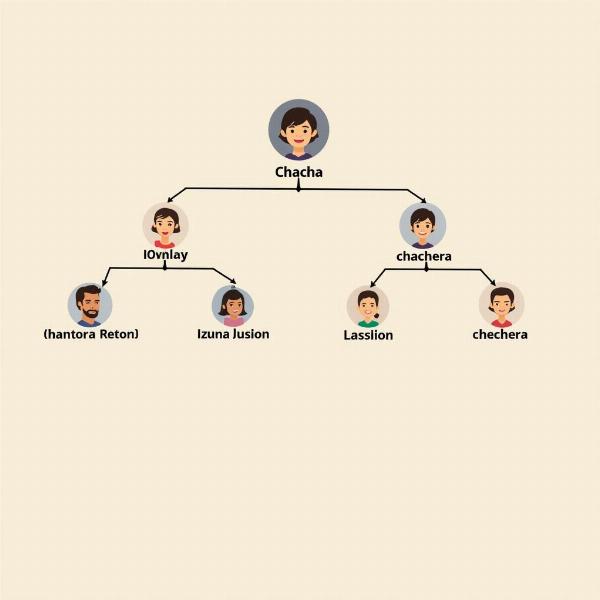Chachera in Hindi refers to a male paternal cousin, specifically your uncle’s son. Understanding familial relationships within Indian culture can often be nuanced, and knowing the correct terminology is essential for clear communication. This article delves into the meaning of chachera, exploring its significance within the broader context of Indian kinship terms and cultural practices.
Exploring the Nuances of “Chachera”
The term chachera originates from the Hindi word “chacha,” which means paternal uncle, or father’s younger brother. Adding the suffix “-era” denotes the offspring of the chacha. While in English, we might simply say “cousin,” Hindi offers more specific terms that delineate the relationship based on the side of the family and even the birth order of the parents. This specificity highlights the importance of family connections within Indian society. Are you curious about other familial terms? This detailed understanding can enrich your interactions and demonstrate respect for cultural subtleties.
 Family tree illustrating the relationship of "Chachera"
Family tree illustrating the relationship of "Chachera"
Chachera in Everyday Conversations
How often do you use the term chachera in daily life? In India, family gatherings are frequent, and these specific kinship terms are woven into everyday conversations. Using the correct term like chachera shows respect and understanding of the family structure. Imagine addressing your chachera simply as “cousin”—it might feel impersonal. These specific terms enhance the feeling of closeness and connection within the family unit.
Cultural Significance of Kinship Terms
In Indian culture, family ties are incredibly strong. Extended families often live together or maintain close relationships, and understanding the complex web of relationships is vital. Knowing the correct terminology, such as chachera, facilitates smoother communication and strengthens these bonds. It’s not just about the word itself; it’s about acknowledging the specific relationship and its significance within the family.
Distinguishing Chachera from Other Cousins
While chachera refers to your paternal uncle’s son, other terms describe different cousin relationships. For instance, “mamera bhai” refers to your maternal uncle’s son. Understanding these distinctions is crucial for navigating social interactions within Indian families. Misusing these terms could lead to confusion or even be considered disrespectful.
What if my father only has older brothers?
Even if your father only has older brothers (referred to as “tau”), their sons are still often referred to as chachera in many North Indian communities, although technically they are “taubera.” This demonstrates the fluidity of language and how cultural practices sometimes supersede strict definitions.
Conclusion: The Importance of Understanding “Chachera”
Understanding the meaning of chachera and other kinship terms provides a valuable insight into the rich tapestry of Indian culture. It emphasizes the importance placed on family relationships and the nuances of communication within these close-knit communities. By using the correct terminology, we show respect for these traditions and strengthen the bonds that connect us. So, next time you address your paternal uncle’s son, remember the significance of calling him “chachera.”
FAQs:
- What is the female equivalent of chachera? The female equivalent of chachera is “chacheri.”
- Is chachera used in all parts of India? While widely understood, regional variations in terminology may exist.
- Why are kinship terms so important in Indian culture? They reflect the deep-rooted importance of family and the complex relationships within it.
- What is the difference between “chachera” and “cousin”? “Cousin” is a general term, while “chachera” specifically refers to your paternal uncle’s son.
- How can I learn more about Indian kinship terms? Resources like family member charts and online dictionaries can be helpful.
- Is it considered disrespectful to use a general term like “cousin”? While not inherently disrespectful, using the specific term demonstrates greater cultural understanding.
- Are there other specific terms for relatives in Hindi? Yes, Hindi has a rich vocabulary for describing various family relationships.
Related Articles:
- what is the meaning of cousin in hindi
- family members name in english and hindi
- vetter meaning in hindi
- blood relation meaning in hindi
Meaning-Hindi.in is your premier resource for professional Hindi translation services, specializing in business, legal, technical, website localization, educational, and urgent translation needs. Our expert linguists ensure accurate and culturally sensitive translations for a diverse clientele. Need help with a translation project? Contact us at [email protected] or call us at +91 11-4502-7584. Meaning-Hindi.in is here to bridge the language gap for you.